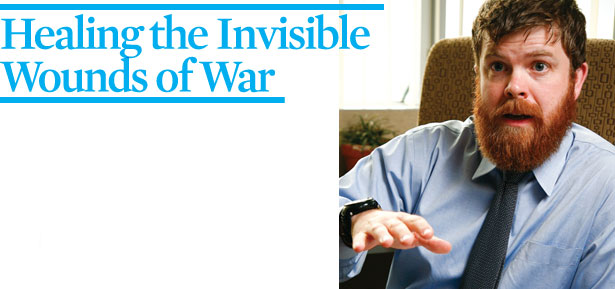
While it may seem counter-intuitive, Winslow Garrish says improvements in health care — integrated care for one — are actually easier to implement inside a large government system like the VA.
Photo by Fritz Liedtke
Joe* comes home from the Vietnam War, marries, raises a family, and stuffs the bad memories — until one day in his 60s when he sits down to be interviewed by his granddaughter for a school project. Suddenly, he is reminded of things he has not thought about in decades.
The nightmares begin soon after. Anxiety attacks. Depression. Anger. Fear of leaving the house. Hopelessness.
Joe goes to the Veterans Affairs hospital for help. Winslow Gerrish M.A. '07, a clinical psychology intern, works with him. Over two months they talk it out. Each time, the conversation becomes easier and the memories less frightening. Joe enrolls in a symptom-management class, learns to share with others having similar experiences, and provides support and encouragement to those not as far along.
Serving those who served on the battlefield presents an enormous challenge to the veterans' health care system. It is one that Gerrish relishes. To complete his Ph.D. in clinical psychology at Seattle Pacific University, he works with SPU Professor of Psychology Kathy Lustyk, and he spent a year interning at the VA Medical Center in Portland, Oregon.
Winner of the 2010 Distinguished Student Practice Award in Clinical Psychology from Division 12 of the American Psychological Association, Gerrish understands the stark reality. While some soldiers return physically wounded, others arrive home also suffering from mental health issues such as anxiety, post-traumatic stress disorder, mild traumatic brain injury, depression, and substance abuse. New patients like Joe come to VA hospitals daily.
Even so, Gerrish exudes optimism. "Where others see discouraging statistics, I see hope for improvement and change. When the problem is human suffering and the solution can improve human well-being, I get motivated."
"When the problem is human suffering and the solution can improve human well-being, I get motivated," says Winslow Gerrish of his work with veterans.
He believes the innovation and change required to bring mental healing to America's returning warriors should properly come from the VA. He was recently accepted to a staff psychology position in primary care within the VA system, the largest single health care system in the country.
"The promising hot topic in all areas of health care is primary care medicine," says Gerrish, who double-majored in philosophy and religious studies as an undergraduate at Whitworth College in Spokane, Washington, and enrolled in Seattle Pacific's clinical psychology graduate program in 2005. "Fully implemented, outstanding primary care would effectively integrate health care."
The national VA initiative known as the "Patient-Centered Medical Home" is a model he says bridges the traditional separation of mental and physical care and will result in greater access to preventive health care and better health outcomes for veterans.
The seeds of Gerrish's passion for integrated primary care took root in Snohomish, Washington, where he grew up the son of a small-town family doctor. "My dad provided continuity of care across generations of local families," explains Gerrish. Sarah, his wife, plans to be a small-town family physician when she completes her medical residency in 2012.
"Personal attention is one great benefit of easy, efficient access to mental health care that a primary care provider can offer," says Gerrish. "The VA, big as it is, is making real inroads in this area."
*Not his real name.
